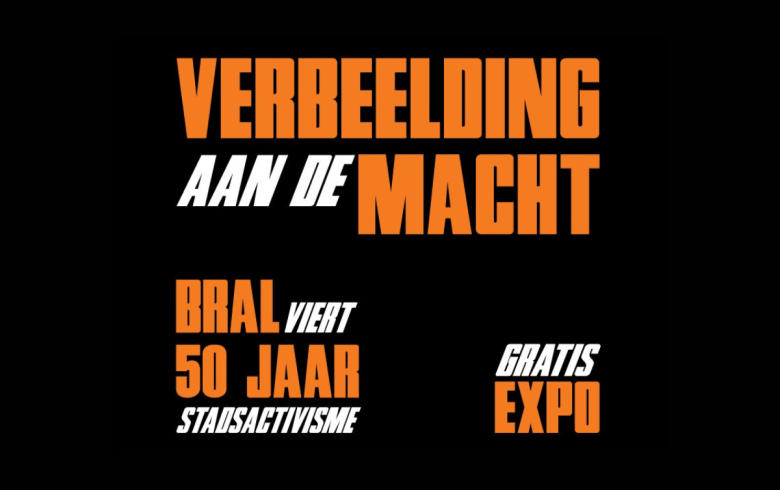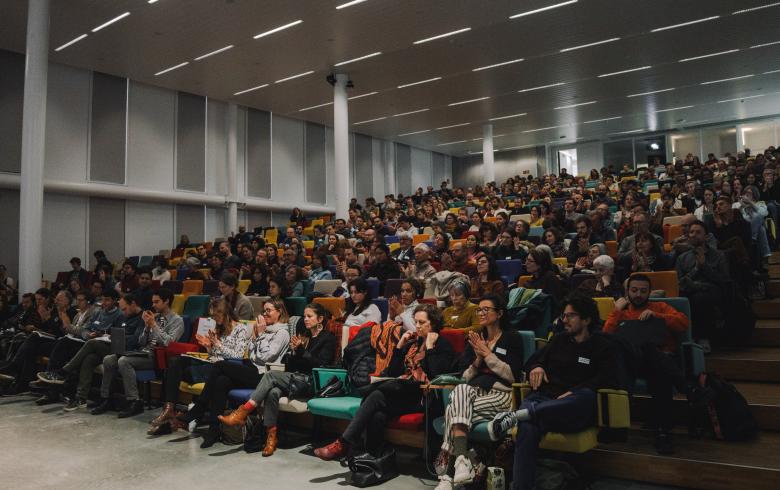
HELLO BERLIN, BRUSSELS CALLING …
Remember how we attended The International Assembly of the Commons in Utrecht last summer? Well, since then we kept in touch virtually with numerous commoners we met during that week in July. As several of them live in and around Berlin, we decided to go see them face to face to learn about how their initiatives had evolved and to exchange experiences. It turned out to be a hot Spring in Berlin as we arrived in the midst of debates about the temporary use of land, renting madness and urban commons. Something we’re not entirely unfamiliar with in Brussels …
Remember how we attended The International Assembly of the Commons in Utrecht last summer? Well, since then we kept in touch virtually with numerous commoners we met during that week in July. As several of them live in and around Berlin, we decided to go see them face to face to learn about how their initiatives had evolved and to exchange experiences. It turned out to be a hot Spring in Berlin as we arrived in the midst of debates about the temporary use of land, renting madness and urban commons. Something we’re not entirely unfamiliar with in Brussels …
A housing crisis ... in Brussels
A while ago, the gate of Toestand’s Biestebroek project was sprayed with the inscription: “Ok avec la gentrification?” On the facades of Atelier Groot Eiland, Le Phare du Channel and a café in Sint-Gilles, critical messages about this subject appeared as well. Why?, we could ask ourselves.
The current legislation of the City of Brussels radically states in its governance document for 2014-2018 that urban development investments are key to revive Brussels. A dilapidating city is not good for anyone, but we at BRAL thoroughly question the way this development is implemented and for whom it is done. Are projects of temporary use or a crowdfunded café really what makes a neighbourhood gentrify? The process of gentrification is complex with many factors influencing its mechanisms. For BRAL, the key answer to gentrification is the access to affordable housing. Already in 2013, we protested against the stealthy change in Brussel during “De Grote Woning Marathon”. We asked the government to build more public and social housing and to regulate the prices on the private rental market. So you see this struggle is nothing new. It is becoming only more profound for an increasing share of the population.
Brussels is the only major city in Belgium where the majority of the population rents: 61.3% in 2016 (the national average is 34%). Rents have increased faster than incomes and, in general, the Brussels population is becoming poorer. In concrete terms, this means that families with an income of at most 1,500 euros must spend an average of 60% of their budget on renting (BBRoW). Over the last 15 years, the rent for housing in the capital has approximately doubled. After all, the number of inhabitants has increased, in contrast to the number of houses on offer. The gap between income and rents is reaching alarming proportions and an increasing number of people and families no longer have access to affordable and decent housing. To this date, the Brussels Region has not taken any action to deal with the disproportionate increase in rents or even the wrong rents (BBRoW).
These circumstances are not just confined to Brussels. Problems with access to housing are also increasing in Berlin and other cities worldwide.
A housing crisis … in Berlin
Eerie wastelands, communist-era housing blocks and gaps in residential streets where houses were bombed: Berlin is a city full of quirks in the urban landscape, the results of its unique history. A poor city, where you can still get around on a low budget drawing all types of people in, most recently the young and creative. When we talk to a shop-owner wandering the streets of Prenzlauerberg we get into a discussion about how the city has changed. Dirk no longer wants to live in the city, he and his family plan to move to what Germans call the Speckgordel, the green belt around the city. It is quieter to live there with a small child. At the moment it is rather difficult in the block they live where people are up until three AM making loud noises.
“In the past you asked to take it down a notch but now the party people are just screaming back: ‘Yo, we are in Berlin dude!’.” Read the full conversation with Dirk here.
Unlike in Belgium and other European countries, most people rent in Germany. In Berlin, 85% of all residents live in rental housing; in the past decade, the average rent on new contracts has increased by 75%. In addition to this price increase, there is a huge shortage of affordable housing (with half the population qualifying for public housing) - the city needs an estimated 200,000 more apartments to house its thriving population. Meanwhile, luxury developments are constructed everywhere. Real estate speculation is a relatively new phenomenon here and it throws the system out of balance.
If a shift like this affects 85% of a city’s population, a substantial critical mass has the power to take action when this evolution goes one bridge too far and threatens their livelihood! At the moment we were in Berlin, a complete week was dedicated to the issue of rising rents. Mietenwahnsinn (rental madness) consisted of meetings and actions during 10 days in April leading to a demonstration against the extreme rise in rents on the 10th day. BRAL was there and took its reflections back to Brussels.
Where are we at? Temporary use under speculative pressure
Many bottom-up initiatives are facing intense pressure because of price hikes in rents and land value in Berlin. The amount of space that can be used for cultural and common-good oriented projects is decreasing. Many of them have functioned as isolated, alternative spaces, but currently people are realising it's time they start connecting in order to find ways to collectively resist the changes happening in the city. Mietenwahnsinn expresses this need to act together, as rising rents and lack of space affects the majority of the people.
In Brussels, we also experience the consequences of space getting scarcer, even more pressingly than in Berlin you could say, as we never had their amount of urban wastelands. However the issues at stake in Brussels are somewhat different because, for example, more people own their house here. Still, people in Brussels also seem to want to connect and create alliances for their actions in order to weigh more on political decisions that determine the outlook of the city. Think of the Sustainable Citizens Assembly of May 2017 and more recently in June the Citizens Festival: Dialogue en Humanité. Think of the Brussels Transition Network that connects initiatives that want to act locally for a more sustainable world, the online platform Brussels Together or initiatives like Civic Innovation Network that try to find new ways of collaboration between businesses, collectives, and the government. After all, it is about thinking forward and acting beyond our own individual interests to tackle the urban challenges we face today.
Prinzessinnengärten, end of lease: 2019
To learn more about the Berlin context in which local common initiatives operate, we passed by Prinzessinnengärten and participated in the Commons-Abendschule. Prinzessinnengärten is located on a site about the size of a soccer field. The patch of land, located at Moritzplatz in the Kreuzberg neighbourhood between Prinzenstraße, Oranienstraße and Prinzessinnenstraße, is owned by the city and was an urban wasteland for half a century. Nomadisch Grün (Nomadic Green) launched the garden as a pilot project in the summer of 2009. Along with friends, activists and neighbours, the group cleared away rubbish, built transportable organic vegetable plots and reaped the first fruits of their labour. To get to know more about the project, have a look at this interview with one of the founders, Marco Clausen.
Since 2009, many efforts have been made to keep the site from private hands. A petition launched in 2012 was signed by more than 30,000 people. It received support from the mayor of Friederichshein-Kreuzberg and concordantly by the Parliament of the Borough. In October, the Berlin Senate acknowledged the ‘pilot function’ of the garden. The board of the public property fund retransferred the property of Moritzplatz to the Borough. Still, the threat of privatization is real: the lease of Prinzessinnengärten with the local government runs until the end of 2018. The possible privatization of this land could lead to the relocation of the garden to a different site or to the ending of the project.
This situation has led to a weekly get-together called the Commons-Abendschule. It is a moment open to everyone who wants to find a solution to the possible privatization of the land Prinzessinnengärten is on. Many other collectives have found, are finding, or will find themselves in a similar situation. This is why a variety of collectives come and share their experiences at the Commons-Abendschule. Together, they want to plan for a commons-oriented future of the garden inspired by CLT standards. A working group at district level is trying to develop instruments for permanently withdrawing places from the market and managing them together with users, neighbours and politicians in a public welfare-oriented and cooperative manner. In that sense the work established around the Prinzessinnengärten project can serve as a prelude for the overall change happening in Berlin and even other cities.
Josaphat: future unclear
At Josaphat (municipality of Schaarbeek, Brussels) nobody is ‘leasing’ the land from the city as the negotiations for a convention between the initiatives that are temporarily using a part of the site and the government are still ongoing. However, the land is also publicly owned and will soon become largely privatised. BRAL has followed the development of this site from up close for years. You can read more about the plans and our opinion here. Negotiations about a part of the neighbourhood being build according to CLT standards are still ongoing but unclear. We can look at the fact that there is dialogue as a tiny step forwards but we really need more than that!
123 searching for a new location
Let’s take a look at another Brussels situation: Woningen123Logements. The 123 develops and federates innovative projects to offer concrete responses to the current housing crisis. However, they will soon lose the building as they are also at the end of their ‘lease’ with the Region of Wallonia. The Koningsstraat 123 has been occupied for eleven years according to an agreement of temporary occupation. However, in November 2017, the Walloon Region sold it to Upgrade Estate, a private company specialising in student housing.
These changes raise quite a few questions for us. Shouldn’t public goods stay public good? Or at least maintain a public function? Aren’t we passing off what is collectively ours to the private market all too easily?
What can we do?
How can we keep buildings and land that are in the hands of the public, (partially) public or commonly owned? How can we realize a shift in mentality that can establish structural change? BRAL sees an opportunity in new forms of collaboration with the city.
They say the commons could be an answer to this crisis. That the commons would allow us to treat our resources - in the broadest sense of the word - with respect and a generative demeanour, rather than an extractive neo-liberal one. Commons offer an alternative vision for that which belongs to us all, both material and immaterial, and are only activated through the social practice of sharing and negotiating. These practices, as part of a growing worldwide movement, seek to bring about systemic change and societal transformation beyond market and state.
From city dweller to co-manager
In our previous article, the city of Bologna, Italy showed us that governments can view citizens as more than mere passive city dwellers or consumers. Bologna’s urban commons initiative began in May 2014, when the city council passed landmark legislation, Bologna Regulation for the Care and Regeneration of Urban Commons. This agreement between the local government and the citizens turns the latter into active co-managers of the resources they use in cities. It is a milestone reconceptualization of how governments can work in cooperation with citizens. People are invited to co-design the city, to manage public spaces, urban green zones, abandoned buildings and other urban issues (David Bollier). BRAL values the active involvement of citizens in the cocreation of cities, but does warn against overburdening people with responsibilities that used to be the government’s. Read more about it in Dutch of French (forthcoming) in the chapter ‘Mélange compliqué bij Parckfarm’ in our publication ‘Burgers in de Brusselse keuken’.
A global fight against speculators
Some cities are shifting their mentality and are taking steps towards structural change. Only a few weeks ago, several cities worldwide singed a joint declaration against property speculation. It is a wish list of five points, initiated by Barcelona’s mayor Ada Colau. Other signatories are Berlin, Durban, Lisbon, London, Montreal, Montevideo, New York, Paris and Seoul. It is clear that cities face the same problems: city centers are becoming uninhabitable for low and middle-income families as commercial speculators buy up properties for the sole purpose of reselling or renting them out for a profit. The message is, above all, an appeal to their own local councils and national governments. By working together, the message may make a bigger impression on the government, says the Amsterdam spokesman. “It helps if we can say in The Hague: we can also see this in London, Paris and Berlin.” (De Volkskrant). Why wasn’t there a spokesman for Brussels standing up for our rights?
Can we motivate our local politicians to join these forces and take care of its people with a gaze on the future? After our exchange with several Berlin based initiatives, we only feel more motivated to fight for structural change in Brussels, to keep public what is public, to create more accessible housing, to build a system that will prevent land and property speculation, to collectively own and govern different services and goods. We are sure that building alliances between commoners in Brussels and throughout cities in Europe will encourage us to keep on going. We can assure you that BRAL will maintain working on this. Some concrete ideas are currently taking shape … so stick around and join the #commonsnetwork!
Contact toha[at]bral.brussels if you want to learn more about the Berlin-Brussels Commons connection!











